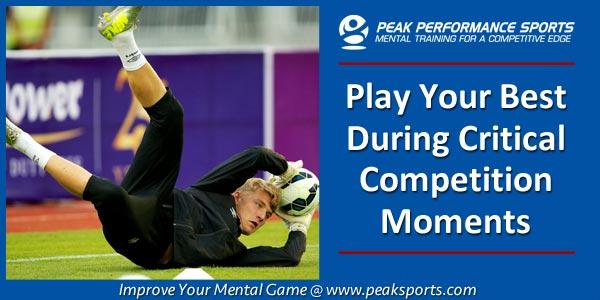
Do You Thrive On Pressure?
Would you consider yourself a “nervous athlete” or a “gamer” in competition?
Gamers tend to raise their performance in critical games and moments–they thrive on the pressure.
However, nervous athlete tend to get lost in critical moments.
Has this happened to you? The game is in its final minutes and your team depends on you for the victory…
You start to think, “If I mess up, everyone will be mad at me.” Your heart is pounding and you are sweating profusely…
You are so afraid to mess up that your anxiety skyrockets.
All athletes face critical moments during competitions.
Why do some athletes rise to the occasion while other athletes fall apart under pressure?
It all boils down to what you think about the game situation. Do you view pressure as a threatening situation or do you see it as a challenge?
How you perceive an event will affect how you approach the situation which, ultimately, affects your performance.
In 1994, Diane L. Gill published a profound research article on competitive stress which remains relevant for today’s athlete, “A sport and exercise psychology perspective on stress” (Quest, 46, 20-27).
Gill explored the stress process and individual responses to stress experienced by athletes during competition.
Gill stated stress is not an event but an individual’s perceptions and thoughts regarding the event. Stress is what you think it is.
Stress isn’t being behind in a game, playing against a higher-ranked opponent, being in a slump or the game being on the line in the closing minutes of a contest.
The process unfolds as follows:
- A big moment or stressor (tied game with a minute remaining, playoff game, heat, fatigue)
- What you think about the moment (fear of failing)
- How you respond (anxiety)
Gill stated without the perception “I think I’m stressed,” there is no stressor. It is your perception of the event (perceived threat) that elicits the stress response.
You could perceive the situation negatively, for example, afraid that you will disappoint your coach, be benched, suffer the ridicule of teammates or view yourself as not good enough.
Your response to an event does not need to be negative.
You could respond to a critical moment during a game in a positive manner (excited, hopeful).
Stress and coping with stress are individual processes.
By understanding how you respond during certain moment, you will be one step closer to choosing a better response.
Try these to play your best during critical moments of competition:
- Tip #1: Develop a strategy to change your thoughts during critical moments during a competition. What are the thoughts that pop up in your mind as you face these situations? Is there a different way to perceive these situations? How can you apply a different thought process during competition? Can you see it as a challenge to embrace?
- Tip #2: Develop a strategy to manage your body’s reaction to stress. Use something that you feel comfortable with and can reduce your anxiety during competitions (deep breathing, pregame music, relaxation, imagery, etc.).
Related Sports Psychology Articles
- Are You a Gamer? How To Perform Under Pressure
- Discover What Type of Athlete You Are
- How to Mentally Prepare for the Big Game
*Subscribe to The Sports Psychology Podcast on iTunes
*Subscribe to The Sports Psychology Podcast on Spotify
Download a free sports psychology report to improve your mental game!
Learn more about our one-on-one mental game coaching.
The Composed Athlete

“The Composed Athlete” is presented on 80-minute Audio Programs with a 70-page step-by-step workbook that guides you through the program each day. It’s a complete system for conditioning your mind to have maximum composure in competition.
“The Composed Athlete” was developed for any level coach, parent, or junior to professional athlete who wants to improve performance and gain a competitive edge. It does not matter if you are a fledgling junior athlete; or a seasoned professional, plagued with distractions; or you just wanting to learn how to improve your composure…
